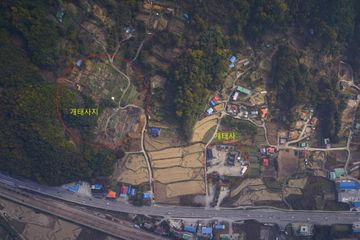개태사지
| 개태사지 Gaetaesa Temple Site |
|
 개태사지, 국가문화유산포털, 문화재청. |
|
| 대표명칭 | 개태사지 |
|---|---|
| 영문명칭 | Gaetaesa Temple Site |
| 한자 | 開泰寺址 |
| 주소 | 충청남도 논산시 연산면 천호리 29-1 |
| 지정(등록) 종목 | 시도기념물 제44호 |
| 지정(등록)일 | 1983년 9월 29일 |
| 분류 | 유적건조물/종교신앙/불교/사찰 |
| 시대 | 0 |
| 수량/면적 | 65637 |
| 웹사이트 | 개태사지, 국가문화유산포털, 문화재청. |
|
|
|
해설문
국문
개태사지는 고려의 태조 왕건이 후백제를 평정하고 승리를 기념하는 한편, 지역의 민심을 달래기 위해 940년(태조 23)에 세운 국찰(國刹)*이다. 광종은 개태사에 아버지 왕건의 영정을 모셔 두고 나라에 큰일이 생길 때마다 길흉을 물었다. 현재 개태사와 마을 일대에는 건물의 주춧돌과 기단**이 널려 있는데 이는 개태사의 규모가 지금보다 더 크고 넓었음을 짐작케 한다. 고려 후기 우왕대1376-1388에 수차례 왜구의 침략을 받으면서 절의 규모가 급격하게 줄어든 것이다. 지금도 절터에는 주춧돌과 돌을 쌓아 만든 석축石築 등이 남아 있으며, 이를 통해 건물 규모가 앞면 5칸, 옆면 3칸에 동서로 21.5m, 세로로 10.3m임을 알 수 있다.
개태사지에서 출토된 유물 중 청동반자(青銅飯子)는 국립부여박물관에, 국보 제213호 금동대탑(金銅大塔)은 리움박물관에 소장되어 있다. 이곳에 남아 있는 유물로는 개태사 오층석탑(五層石塔)과 삼존석불입상(三尊石佛立像), 철확(鐵鑊) 등이다. 절터에는 물통의 일종인 석조(石槽)가 있고, 용화사에는 공양보살상이 있다.
- 국가의 절
- 건축물의 터를 반듯하게 다듬은 다음에 터보다 한 층 높게 쌓은 단
영문
Gaetaesa Temple Site
This is the former site of Gaetaesa, a Buddhist temple founded in 940 by King Taejo (r. 918-943) of the Goryeo dynasty (918-1392). After defeating Later Baekje, he built this temple to commemorate his victory and appease the sentiment of the local people. King Gwangjong (r. 949-975) enshrined a portrait of his father, Taejo, at this temple and prayed for the well-being of the country.
Stone foundations and bases presumably used for the temple’s buildings have been discovered around the temple site and neighboring villages, suggesting the temple was very large at its zenith. Based on a stone foundation left at the temple site, one of the temple’s building is presumed to have measured 21.5 m in width and 10.3 m in length. The temple fell into ruin after it was destroyed several times by Japanese invasions in the late 14th century.
Artifacts found at this temple site include a bronze gong (now kept at Buyeo National Museum), a gilt-bronze pagoda (National Treasure No. 213, Leeum Museum), a five-story stone pagoda (Chungcheongnam-do Cultural Heritage Material No. 274), a stone standing Buddha triad (Treasure No. 219), an iron cauldron (Chungcheongnam-do Folklore Cultural Heritage No. 1), and a stone basin (Chungcheongnam-do Cultural Heritage Material No. 275).